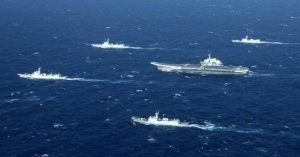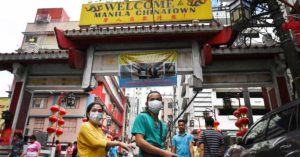IN strengthening bilateral relations between the Philippines and China, diplomatic activities and cultural exchanges between the two countries, both at the state-to-state and people-to-people levels, are pivotal ingredients in enhancing mutual understanding, cooperation, friendships, and the resolution of differences and conflicts of interests.
In the same manner that the inter-state relations between the two countries are significant, people-to-people ties are thus far one of the building blocks that strongly bind the bilateral relations of China and the Philippines.
People-to-people is the interaction between ordinary citizens of two countries at various levels without official interference or guidance.
Historical context
Historically, contact between Filipinos and the Chinese can be traced back to ancient times. Indeed, the Philippines and China have long shared histories, kinships and cultural affinities, which could be traced back to pre-colonial times before the Spanish colonization. As early as 3,000 years ago, Chinese and Filipinos were already conducting people-to-people exchanges, commerce and trade.
According to historians and based on early Chinese writings, China began trading with the Philippines as far back as the 7th century with ancient coins and porcelain as trading goods through the Galleon trade. Chinese traders would barter China wares, iron, lead and zinc with Philippine products such as condiments, beeswax, betel nut and pearls.
Likewise, among countries in Southeast Asia, the Philippines is thus far geographically one of the closest, if not the closest, to China, only separated by the waters of the South China Sea (SCS). To note, the official diplomatic relations between the Philippines and China were established on June 9, 1975.
People-to-people ties
One of the instrumental and pivotal factors that helped establish and strengthen the official diplomatic ties between the Philippines and China is people-to-people relations. Before establishing official diplomatic ties between the two countries, the Association for Philippines-China Understanding (APCU), a nongovernment organization (NGO) based in the Philippines, was already actively promoting people-to-people relations between the two countries.
The APCU is the pioneer and leading NGO in the Philippines for promoting people-to-people diplomacy, bilateral understanding, and friendship between the Philippines and China through a) cultural, academic and visit exchanges; b) sisterhood between Philippine local government units (LGUs) and Chinese LGUs; and c) economic and trade cooperation and partnership.
The association started as an informal group of Chinese friends in 1972 organized to coordinate aid and assistance from the People’s Republic of China for the victims of a destructive flood that struck Central Luzon at the time. China had no diplomatic relations with the Philippines at the state level during that time. Thus, cooperative efforts between the two countries were coursed through people-to-people links and ties.
This experience expanded the group to include other progressive artists, business people, journalists, civic leaders and academics. Eventually, in 1974, APCU was set up and registered as an NGO with the Securities and Exchange Commission (SEC).
As part of its programs/projects, it organized study and cultural visits to China. It also staged various projects like forums and symposiums and came up with newsletters launched to promote bilateral understanding, cooperation and friendship between the two countries. These projects and activities notably preceded the establishment of diplomatic relations between the Philippines and China in June 1975.
The APCU was recently reactivated under the leadership of one of its founding members, former President Gloria Macapagal Arroyo, who is the chairman emeritus of the organization. It has regional chapters in Baguio, Cebu, Davao, Angeles City and Pangasinan.
APPCU
In 2021, APCU launched two important projects that help further promote mutual understanding, friendship, and cooperation between the two countries and peoples. These projects are the Manila Forum for China-Philippines Relations and the Award for Promoting Philippines-China Understanding (APPCU).
It may be recalled that on Jan. 16, 2021, former state councilor and foreign minister Wang Yi and former president Arroyo jointly attended the inauguration of these projects via video link.
The primary rationale behind the launching of these two projects is to actively continue promoting friendship between China and the Philippines and enhancing people-to-people exchanges, noting that amity between people holds the key to sound state-to-state relations.
The setting up of the Award for Promoting Philippines-China Understanding (APPCU) aims to encourage more people to promote the China-Philippines friendship between the two peoples and promote further and strengthen mutual understanding to overcome differences between the two countries and peoples.
The APPCU looks for individuals who have made efforts through time to strengthen ties and promote friendly relations between the Philippines and China. It also encourages Filipinos to help and commit to fostering China-Philippine friendship and mutual understanding.
The APPCU was jointly set up by the embassy of the People’s Republic of China in the Philippines and the APCU.
APPCU 2023 laureates
Since the launch of the third year of APPCU in January of this year, members of the board and the committee behind the awards have endeavored to streamline its search for well-deserving individuals for recognition of their efforts and contributions in fostering and promoting understanding, appreciation and the reinforcement of amity between the Philippines and China.
Six public and private sector individuals have passed the 2023 APPCU three-stage selection and judging process from a list of nominees beginning in the early quarter of this year. Their works’ prestige and endeavors in promoting and strengthening the friendship and mutual understanding between the Philippines and China are essentially the basis for selecting them as APPCU laureates for 2023.
This year’s APPCU Hall of Fame awardees are former President Rodrigo Roa Duterte and Ambassador Carlos Chan, former special envoy of the Philippine president to China.
The awardees for the APPCU Outstanding Contributions are Ambassador Rigoberto D. Tiglao, a columnist at the Manila Times and former Philippine ambassador to Greece and Cyprus, and Ambassador Jaime T. Cruz, MD, former special envoy to China, trade and investments.
The awardees for the Major Contributions category are Regina Rosa D. Tecson, the director of the satellite office of Vice President Sara Duterte in Davao City, and Jose Ong Tajan, former president of APCU Baguio and also the former chairman of the Filipino Chinese Chamber of Commerce of Baguio City. The six awardees will be recognized in an award ceremony on June 8, 2023.
Conclusion
Promoting and strengthening people-to-people relations exemplified by APPCU as a form of public diplomacy is vital in engagement and relationship building between the Philippines and China.
The building and cultivation of people-to-people links and ties to sustain a healthy, strong and mutually beneficial relationship between the two countries are indeed significant. Thus, it is essential to acknowledge the vital role of stakeholders like the APPCU laureates in contributing to strengthening the vitality of Philippines-China bilateral relations, friendship and mutual understanding and supporting them in their activities.
As neighbors facing each other across the sea, despite differences and conflicts of interests in the contested waters of the SCS, China and the Philippines boast geographical proximity, cultural affinity and a long history of friendly people-to-people exchanges. This friendship between the two peoples must carry on, move forward, and be passed down to the present and succeeding generations.
One should not forget that effective public diplomacy is anchored on solid and lasting people-to-people links and ties between countries.
Source: The Manila Times
https://www.manilatimes.net/2023/06/01/opinion/columns/the-people-to-people-ties-that-bind-and-bond-ph-cn-friendship-and-mutual-understanding/1893931



